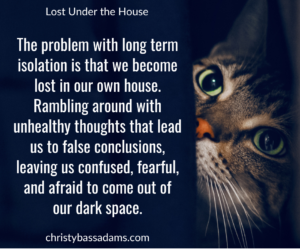What’s That Sound?
“Do you hear that?”
“Hear what?” my husband asked.
“It almost sounds like a cat. Like it’s under the house, right below my chair.”
“There’s nothing down there. You’re hearing things.”
“I just heard it again. I’m telling you, there’s something under the house.”
We grabbed a couple flashlights and pulled the skirting back on the side of the house. David shined the light all around.
“There’s nothing under here,” he said as the beam moved back and forth.
“Stop. Listen,” I whispered. “Turn the light off and listen. It’s coming from over there.”
Sure enough, we both heard the distressed mew of a cat.
“Do you think it’s Scruffy? We haven’t seen her in a few days.
My husband responded confidently, “I highly doubt it. She’s five years old. Why would she be under the house acting lost and scared? Something ate her, the way she rambles in the woods. This is probably a kitten or something.”
We followed the meowing sounds, my husband under the house, me on the outside. As we got closer, the distressed cat sound grew louder.
“I see something,” my husband said.
We both moved closer.
I pulled the skirting back on the end of the house and shined my light right into the big-eyed face of the cat. “Scruffy? What in the world are you doing under there?”
I reached out and picked up the terrified cat. Her stomach appeared sunken in, her heart rate was elevated, and her pupils were dilated like she hadn’t seen sunlight in days.
Scruffy came inside with us as we calmed her down and gave her food. The only logical explanation seemed to be that a critter of some kind got after Scruffy, and she sought refuge under the house. But why she didn’t come out is beyond any of our ponderings.
When We Get Lost
As we said goodbye to Scruffy this weekend, after eighteen years, this story came to mind. What’s crazy is this was not an isolated event. Three times she “got lost” under the house and we had to crawl under and retrieve her.
It made me think about real life and how we as people are so quick to shut down and isolate when hard situations come our way. When I speak at Honey Lake Clinic, one of the top indicators of depression that folks share is isolating. In my own life, when the world seems to be crashing down on me from all sides, the last place I want to be is in a crowd of people—even people that I know and love. Controlling my emotions seems too hard. Navigating the long list of social rules is overwhelming. And isolation is the natural response.
 The problem with long term isolation is that we become like Scruffy—lost in our own house. Rambling around with unhealthy thoughts that lead us to false conclusions, leaving us confused, fearful, and afraid to come out of our dark space.
The problem with long term isolation is that we become like Scruffy—lost in our own house. Rambling around with unhealthy thoughts that lead us to false conclusions, leaving us confused, fearful, and afraid to come out of our dark space.
If Scruffy had recognized she was isolating, she could have come out, found us, and we would have consoled her. The same goes for us. If we quickly recognize the signs of hiding and isolation, we can emerge, reach out to our loved ones, be encouraged and comforted, bringing all those overwhelming thoughts into the light.
Isolation is a scary place to stay. Jeremiah the prophet said, “The heart is deceptive above all else,” and the Apostle Paul instructed us to “take every thought captive.” Our emotions and thoughts, stuck inside our own heads, never said out loud, lead to crazy, irrational conclusions. They can’t be trusted.
Are you lost in your head? Are you content in isolation? If so, you’re missing out on a world of truth and relationships. Come on out of hiding. The critter is gone. No reason to stay under the house any longer.
